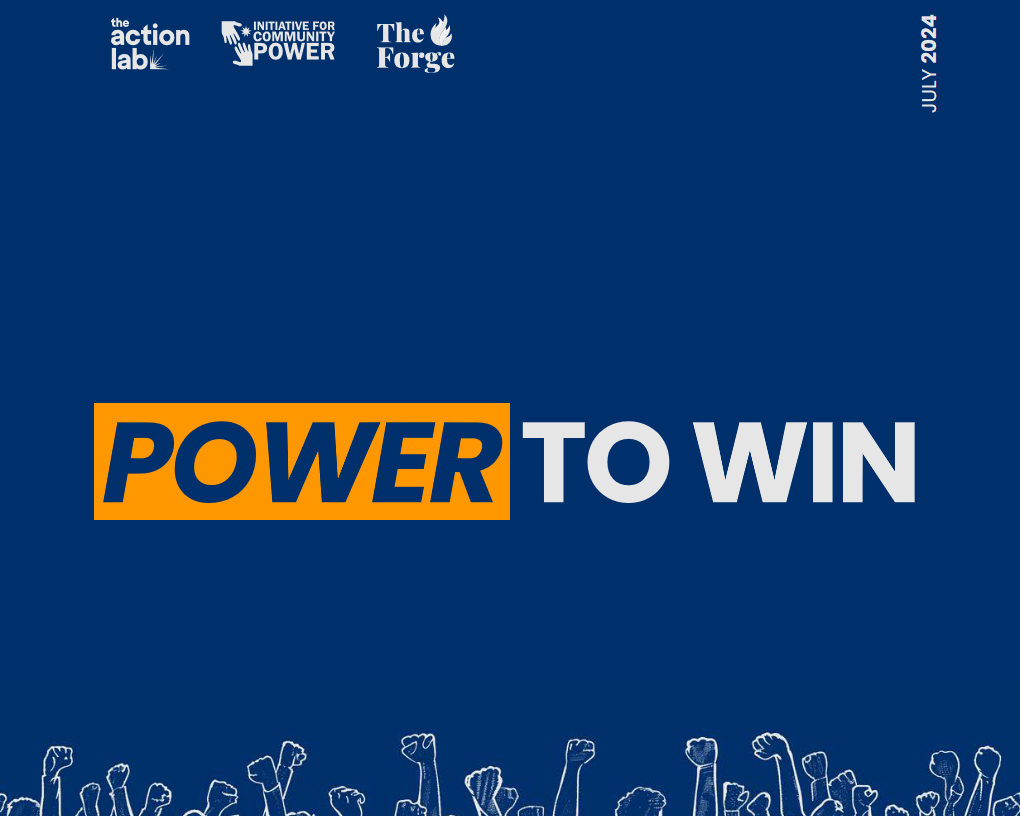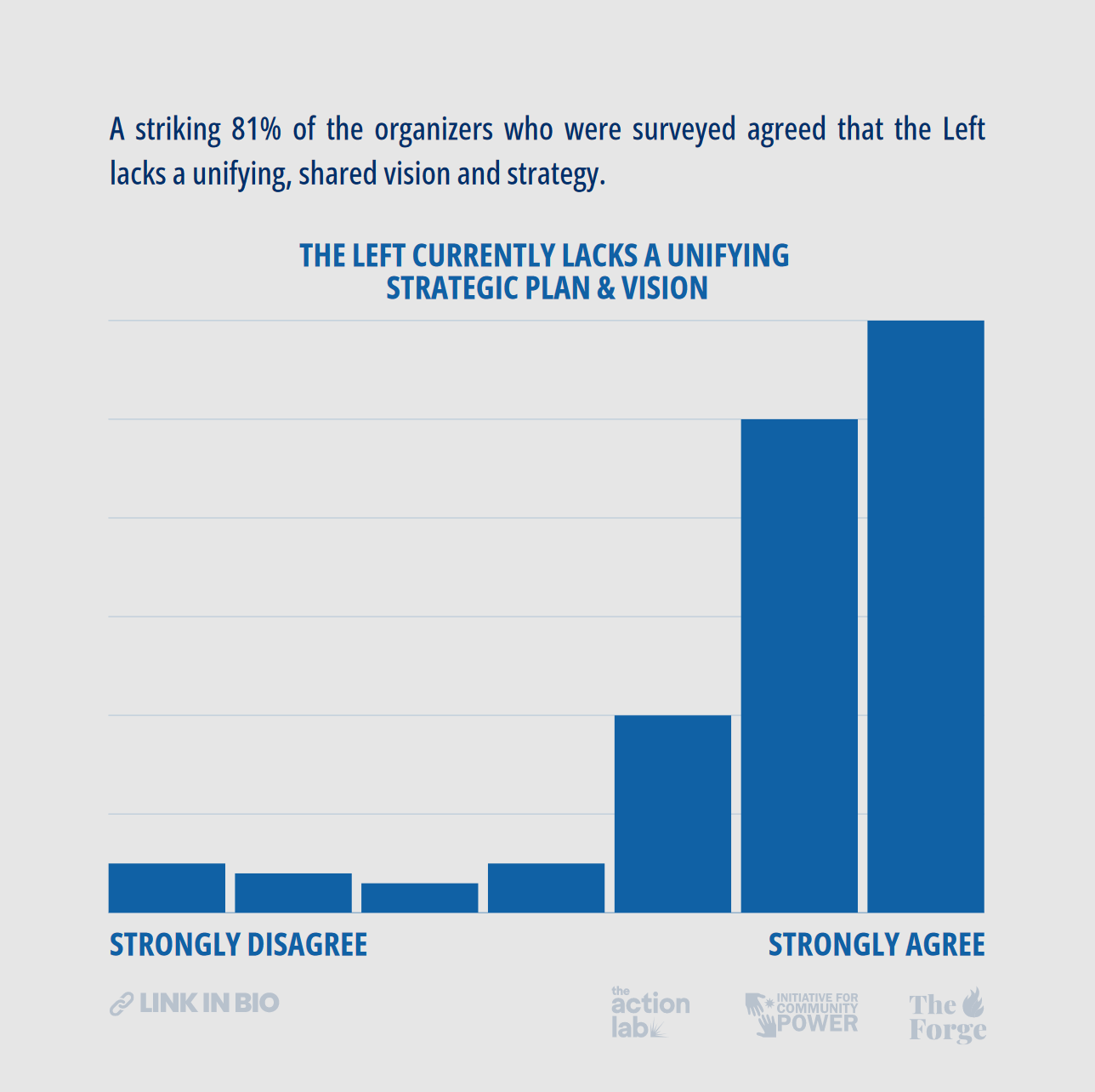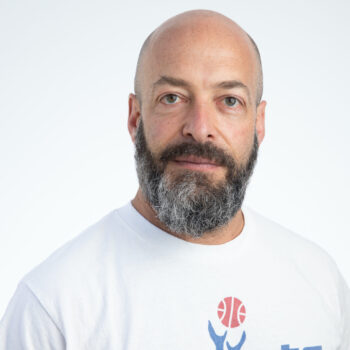Across the country, progressive organizers are pouring tremendous energy and ingenuity into campaigns to win policies that will make our communities stronger. They are building relationships with residents, welcoming new members into their organizations, and supporting these new members to take on increasing leadership in local state and federal fights. They are making heroic efforts to gather resources needed to support this work on an ongoing basis. And they are pushing back against a relentless onslaught of right-wing attacks on the populations and communities to which they are so deeply committed. Still, it is not enough.
In recent years—troubled by the Left’s inability to amass sufficient power as well as the ascendancy of Right-wing forces—an increasing number of progressive organizers have begun to register higher and higher levels of alarm. They have argued that the transformation in service of racial, economic, and climate justice that progressives seek will not happen unless we change our approach.
The “Power to Win” report constitutes an effort to learn from these organizers—not only about what we lack but also what shifts might bolster our collective power. It was conceptualized by the Power Working Group (PWG), a collection of nine organizers from across a range of sectors and organizations. PWG members drew upon their deep experience to distill a set of powerful questions and identify a universe of over 200 organizers to help answer them.
This project had four core goals:
- To inform current conversations by supporting groups on the American Left to organize themselves around a series of rigorous, shared analyses of the most salient challenges of the moment;
- To spark efforts by progressive organizations to ideate further, expanding on the insights captured in the “Power to Win” report;
- To inspire colleagues in the field to intervene by launching experiments that test the project’s proposals; and
- To marshal human, financial, and other resources and infuse them across the field so that promising interventions can be realized at scale.
This project culls insights from 100 interviews and 184 surveys completed by Left-wing organizers. This group included deeply experienced organizers and others with fewer years in the profession. It included individuals who have worked exclusively in the field and others who have moved on to roles at strategy and policy centers, academic institutions, or philanthropic organizations. The group was also diverse with respect to gender, race, age, disability status, and economic class.
Themes that emerged in interviews were incorporated into survey questions. The “Power to Win” report’s resulting combination of quantitative and qualitative insights allows readers a window into broad trends as well as the thinking animating these shared views. The report is organized around five areas of inquiry, each of which is the subject of its own discrete module.
- Power, Vision, and Strategy on the Left
- Status of Our Leadership Pipelines, Training and Education, and Preparation to Govern
- Views on Funding and Philanthropy
- Barriers to Building Power on the Left
- Promising Approaches to Broadening the Left
First, we asked organizers to share their thoughts on “Power, Vision, and Strategy on the Left,” including their degree of concern about the amount of power progressives currently hold, how they conceptualized power and where they saw power concentrated. We learned that over half of those surveyed rated their degree of alarm concerning the limited nature of progressive power at ten on a ten-point scale, and taken together an astounding 90% rated their level of anxiety at eight or higher. A striking 81% of the organizers who were surveyed agreed that the Left lacks a unifying, shared vision and strategy, and an impressive 72% ranked the importance of such a unified plan at seven or above on a ten-point scale. Check out our report for further details on what both groups felt strongly was needed to address these concerns.
Next, we asked organizers to weigh in on the “Status of Our Leadership Pipelines, Training and Education, and Preparation to Govern.” This gave them an opportunity to reflect on the steps that the Left is taking to bring in and retain new organizers as well as to build skills and sharpen analysis within the field. It also prompted examination of the degree to which progressives are prepared to govern when they secure elected positions. This exploration revealed that a striking 75% of survey participants indicated that having too few organizers was a problem demanding an immediate solution and rated the urgency of this issue at seven or above on a ten-point scale. Similarly, three out of four of those surveyed applied the same rating when asked about the urgency of addressing progressive organizations’ failure to prepare organizers to succeed. Likewise, roughly the same portion of survey participants assigned a similarly high rating when asked about the urgency of addressing organizer retention issues. Importantly, however, there was agreement among both newer organizers and their more seasoned colleagues that structured mentor-mentee relationships would be an important part of solving these pipeline challenges.
We then asked for organizers’ “Views on Funding and Philanthropy,” posing important questions about the impact of philanthropic dollars on accountability to community and exploring what could make for healthier relationships between funders and the field as a whole. We discovered that eighty-five percent of respondents—the overwhelming majority—agreed that Left-wing organizations have become more accountable to our funders than to our bases and constituencies. Almost all organizers—95%—felt that progressives need independent, non-philanthropic revenue streams, and organizers also suggested ways that philanthropic institutions could shift, becoming better partners to and enhancing the effectiveness of Left organizations.
Organizers were also prompted to identify “Barriers to Building Power on the Left.” They shared a rich set of insights concerning resources, strategy, cooperation, and inclusivity. They also commented on the impact of Right-wing interference and structural weaknesses in U.S. democracy. We learned that organizers felt that we do not have the resources to support long-term transformation, with 55% indicating that current resources are insufficient. They also signaled that philanthropic organizations need to shift their funding to power building (95%), political education (86%), and coalition-building efforts (86%). We also found that two-thirds of organizers indicated that we should orient our power-building efforts ten years or more in the future, evidencing preference for long-term visioning and planning and, ostensibly, the clarity of purpose this requires. Over half of the organizers we surveyed indicated that we are losing ground to the Right. They recognized that the combination of active Right-wing interference and the long-term predominance of Right-wing ideas and frames hampered progressive efforts to engage more Americans. Furthermore, the overwhelming majority of organizers agreed that there is too much infighting on the Left, and a solid majority indicated that our ability to form alliances was hampered by our application of an excessively high bar for acceptable politics. Check out The Power To Win report to learn more about how organizers are thinking about systemic problems with U.S. democracy and how that is impacting our ability to wield power.
Lastly, organizers also offered guidance on “Promising Approaches to Broadening the Left.” Their responses in this area revealed that the overwhelming majority of organizers felt that our current tactics are insufficient to achieve our aims, and nearly all of them were convinced we needed to innovate new organizing and power building models. A significant portion of organizers agreed that people are not joining the Left because we place excessive emphasis on issues that alienate those we need to engage. At the same time, interviewees suggested we were failing to tap deeper and more powerful sources of motivation for engagement. Nearly all survey respondents agreed that we need to engage a broader swath of multiracial working class people in our organizations’ work, and there was large consensus that we are not currently sufficiently focused on the priorities and material needs of our base. Furthermore, there was overwhelming agreement that progressives need to engage with people who do not think like we do.
Consistent with its goal of moving from observations about challenges to crafting solutions, the report concludes with a set of proposed “Movement Interventions” that emerged from our conversations with organizers. The most popular among these speak to the breadth of organizers’ analysis and their enduring faith in what is possible if the Left mobilizes its collective resources with an eye to what matters most. These include:
- An overwhelming 78% or organizers expressed interest in power analysis and mapping beyond specific campaigns;
- Almost three quarters of organizers surveyed—74%—were in favor of strategic capacity training;
- An impressive 68% called for an organizing academy for both member leaders and organizers;
- Some 65% craved connections to people that are in similar organizing spaces, whether for the purposes of sharing lessons learned or joining forces for greater impact; and
- Well over half—59%—favored convenings to support learning and build broadly shared analysis.
We view the “Power to Win” report as the beginning of a dynamic process of conversation, research and analysis, experimentation, and resource generation. We hope that the thoughtful, candid insights that organizers offered in these pages will drive broader recognition of the urgency of the situation before us.
The Action Lab, The Forge, and the Initiative for Community Power anticipate partnering with others on the Left—including individuals and organizations that have also sounded alarms about these challenges—to act on what the organizers with whom we consulted have generously shared. If you are interested in tracking these efforts, we encourage you to follow our organizations using the information below. To share more about your work or explore opportunities for collaboration, contact ICP Fellow, Daniela Tagtachian, at dtagtachian@gmail.com and copy Andrew Friedman, Senior Director of Strategy and Co-Founder at The Action Lab, at andrew@actionlabny.org, and Miski Noor, Publisher at The Forge, at mnoor@forgeorganizing.org.




